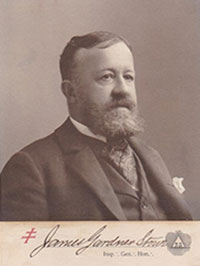

Col. James Gardner Stowe, 33°
(Jun 14, 1840-Jan 2, 1908)
1885 - Raised, Yeatman Lodge #162, Providence, RI
1886 - 32° Ohio Consistory, Valley of Cincinnati, NMJ
Affiliated with the Valley of Kansas City, MO, SMJ
1890 - Knight Commander of the Court of Honour, SMJ
1890-97 - Commander, DeMolai Council of Knights Kadosh
1893 - Coroneted 33° Inspector General Honorary, SMJ
1888 - Member, Ararat Shrine Temple
Occupation: Entrepreneur, manufacturer, manager of Whitman & Barnes Manufacturing, Consul General to South Africa
James Stowe was born in Providence, Rhode Island. He attended public schools and the Mowry Institute. He then became a mechanic and a draftsman under the direction of his father. In 1861 he became the secretary for the Burnside Rifle Company and superintendent for the Burnside Laboratory where ammunition for the rifles was manufactured. He developed a machine that filled cartridges rapidly loading 1,000 cartridges in 45 seconds that came into general use by all United States arsenals. He served as an rifle instructor for troops in Washington DC for a time during the Civil War. In 1865 he became treasurer of the Perkins Sheet Iron Company and of the Rhode Island Horse Shoe Company. He continued as secretary when the Burnside Rifle Company was changed to the Rhode Island Locomotive Works. At around 1870 he created a machine shop in Bloomington, Illinois for manufacturing reapers and other farm implements of his own design. He closed that business and accepted a position with Whitman and Barnes Manufacturing of Ohio. In 1887 be was sent to Kansas City to take charge of their branch there until 1894 when he established the Stowe Implement Supply Company.
In 1897 Brother Stowe was appointed Consul General to South Africa and served for four years until 1901, a portion of that time was during the Boer War. Stowe resigned the position due to an insufficient salary of $3,000 for a family living in South Africa in the high cost of living in-country - a situation exacerbated during the Boer War. His resignation caused a group of New York businessmen to approach President McKinley with an offer to pay for a raise in the popular Colonel Stowe's salary but the the law prohibited private funding of the nominal salary allowed by Congress. An interview with Colonel Stowe upon his return to Kansas City revealed that during his four-year term as Consul American trade with South Africa had increased from $6,000,000 to $20,000,000 in 1901 dollars.
Interred: Mt Washington Cemetery, Independence, MO

